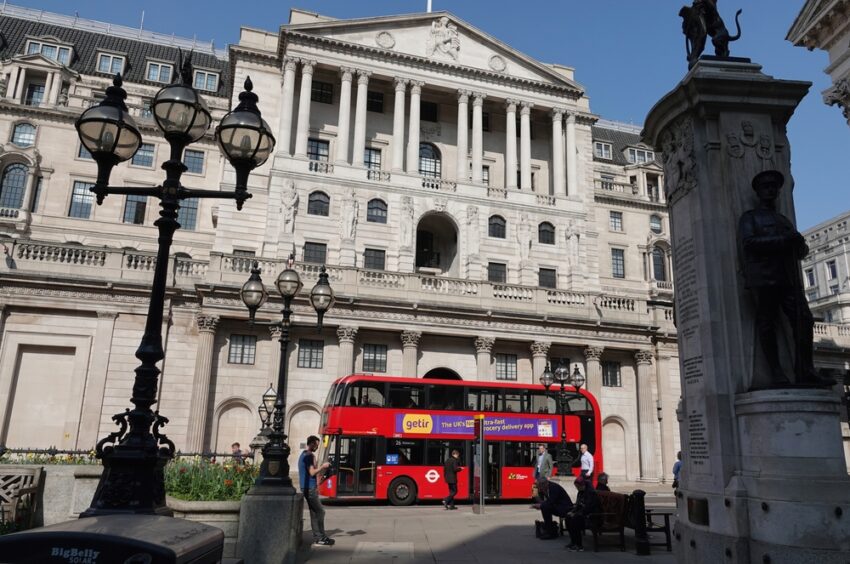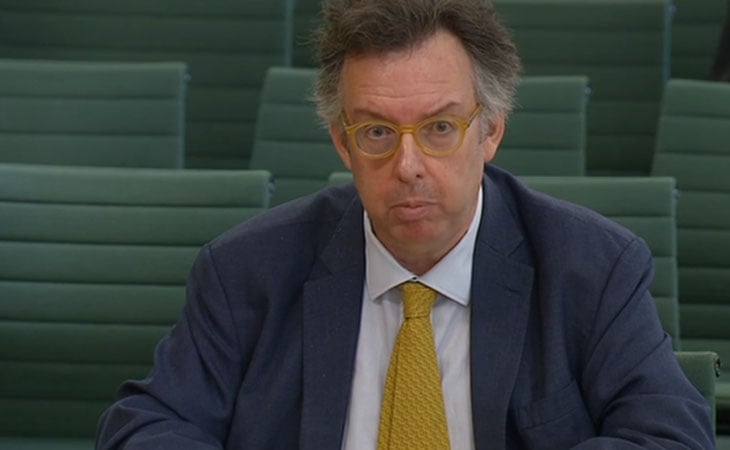Latest News
- Details
- Hits: 521
The Bank of England is expected to reduce interest rates significantly faster than financial markets currently anticipate, according to new forecasts from Goldman Sachs.
The Wall Street investment bank projects that the UK’s base rate could drop to 2.75% by November 2025, driven by continued progress on disinflation and dovish signals from policymakers.
At present, the UK base rate stands at 5%, which Goldman Sachs described as “notably restrictive.” The investment bank’s researchers believe that the Bank of England will lower rates more aggressively than is priced in by markets, as inflation continues to ease. In contrast, market consensus suggests a slower decline, with rates expected to settle at around 3.5%.
Differing views on rate cuts
Goldman Sachs’ predictions align with those from Deutsche Bank, which also expects faster-than-anticipated cuts, albeit at a slower pace. Deutsche Bank forecasts the base rate to fall to 3% by February 2026. Meanwhile, financial markets currently expect two 25 basis point reductions by the Bank of England in November and December this year, bringing the base rate down to 4.5%.
The projections follow a faster-than-expected drop in UK inflation, which fell to an annual rate of 1.7% in September from 2.2% in August. This has raised expectations that the Bank of England will ease monetary policy, although views within the Bank’s Monetary Policy Committee (MPC) differ on how quickly to act.
Andrew Bailey, the Bank’s governor, has suggested the MPC could be more aggressive in lowering rates if inflation stabilises, while Huw Pill, the Bank’s chief economist, has favoured a more gradual approach. The panel’s upcoming discussions at the International Monetary Fund meetings in Washington are expected to offer further insights into the Bank’s strategy.
Balancing economic pressures
The challenge for policymakers is determining the “neutral interest rate”—the rate that neither stimulates nor constrains economic activity. Goldman Sachs estimates the UK’s neutral rate at 2.75%, up from the negative real-terms rates seen following the global financial crisis. After accounting for inflation, they estimate the real neutral interest rate to be around 0.8%, in line with historical averages.
However, determining this rate is complicated. The UK economy faces a unique mix of factors, including slow productivity growth, rising public debt, and an ageing population, all of which weigh on long-term economic potential. The country’s debt-to-GDP ratio has surged from 35% in 2007 to nearly 100%, its highest level since the 1960s, placing further pressure on the economy.
In addition, Chancellor Rachel Reeves is expected to increase borrowing in the upcoming Autumn Budget to fund public investment, a move analysts believe is unlikely to cause the kind of market instability triggered by former Prime Minister Liz Truss’s tax cuts last year. Reeves’ approach is expected to focus on investments that could boost long-term growth, rather than short-term fiscal giveaways.
Uncertainties around neutral interest rates
Central bankers often use estimates of the neutral interest rate to guide monetary policy, but these estimates are subject to significant uncertainty. A miscalculation could lead to rates that are either too high, constraining economic growth, or too low, stoking inflation. Goldman Sachs noted that while the Bank of England has indicated a neutral rate of around 2-2.5%, it remains cautious about placing too much weight on this estimate.
As the Bank of England navigates these uncertainties, the debate over how quickly to lower rates will be shaped by evolving economic data, particularly inflation trends and global economic conditions. With interest rates potentially falling as low as 2.75% next year, businesses and consumers alike will be watching closely to see how the Bank of England responds to the changing economic landscape.
- Details
- Hits: 499
The Housing Ombudsman Service, which is expected to become the main regulator of landlords after the Renters’ Rights Bill becomes law, has said that those who ignore its decisions should have to pay back rent to their tenants via a Rent Repayment Order.
Its chief, Richard Blakeway, made the comments during an evidence session at Parliament yesterday in front of its Housing Select Committee, including housing minister Matthew Pennycook.
The Renters’ Rights Bill includes proposals that will see a completely new mechanism for tenants to complain about – and get redress from – their landlords when tenancies go wrong and the Housing Ombudsman Service is widely expected to get the role.
During the committee’s questioning Blakeway said one of the areas not tackled by the Bill was enforcement and, in particular, what would happen if landlords ignored the ombudsman’s ‘remedies’ when tenants complained.
Rent repayment
Blakeway suggested that, rather than local authorities chase up non-compliant landlords, instead landlords should be subject to rent repayment orders via the First Tier Tribunal system, as is the case currently when they are found not to licenced properties within areas covered by selective or HMO schemes.
The Bill already includes measures that will see landlords who do not sign up to the ombudsman face RROs, which in London can run into tens of thousands of pounds, so this would be an extension of this idea.
Reaction

Sean Hooker, Head of Redress at the PRS, says: “The ‘Big Stick’ approach is not the full picture – of course, landlords who seriously break the law and regulations need to be cracked down on, but most tenant complaints are small issues which have a big impact of on their quality of life.
“They cannot wait weeks or months whilst a contorted process considers maladministration or enforcement; they just want things put right.
“So I agree that a strong framework is needed to intervene and help landlords to do the right thing before things get worse.
“This is essential to be put in place before the ombudsman is set loose; landlords and tenants should have access to help and advice, access to mediation and private resolution and signposting to what help is available.
“The agent redress schemes already do this at the moment and I am keen these services are available to tenants who deal directly with landlords.”
The Housing Ombudsman Service is currently the main regulator of the social housing sector.
- Details
- Hits: 575
Reapit is worried that the new rules on rent increases will see tenants, landlords and agents tied up in a Tribunal system ill-equipped to deal with a rise in case work.
Agents are facing a massive increase in rent rise challenges once the Renters’ Rights Bill becomes law in the spring of next year, warns Reapit’s Steve Richmond (main image)
Even before the RRB becomes law, proptech company Reapit’s research found that over the number of fair or market rent cases brought before England’s Residential Property Tribunals has increased by almost 89%, from 483 to 921 over the last four years.
Once it does become law, Section 13 will be the only method landlords can use to raise rents, which can only happen once a year. Any English tenant served with the notice can challenge the rent hike, potentially leading to millions more cases going to tribunal each year.
Frustrations will grow for both tenants and landlords.”
It is likely to lead to huge delays in an already overstretched court system which is in the midst of a digitisation process that is proving problematic.
Steve Richmond, General Manager of Reapit UK&I, stressed the need for more investment and reform to expand court capacity before the Bill becomes law, saying: “Without ramping up funding for our courts and tribunals, frustrations will grow for both tenants and landlords.
Strained system
“The Renters’ Rights Bill brings significant changes but adds more pressure to an already strained system.
“We’re also concerned the government hasn’t fully considered the added costs to courts and tribunals, as no impact assessment has been published.
He adds: “If landlords lack confidence in the court and tribunal system to handle rent appeals and evictions quickly and fairly, we are concerned about the unintended consequences.
“We need the government to address the court and tribunal backlog because lengthy delays will burden both landlords and tenants with months of uncertainty. This could lead to a drop in tenant satisfaction, and we fear landlords may exit the sector.
“This would happen at a time when more homes are urgently needed in the PRS.”
- Details
- Hits: 652
Rachel Reeves will not use her budget to increase capital gains tax on the sale of second homes.
The Times reports that capital gains on profits from the sale of shares and some other assets, which is currently levied at 20%, is likely to increase by “several percentage points”. But the rate will not change for second homes.
The chancellor will reportedly leave the rate of capital gains tax on the sale of second homes and buy-to-let properties untouched amid concerns that increasing it would cost money.
When the Conservatives lowered the rate from 28% to 24% at the last budget, the Office for Budget Responsibility said that doing so would actually raise nearly £700 million because of increased property transactions.
Ministers are reportedly concerned that raising tax on the sale of second homes would damage overall revenues.
More than half of all capital gains relates to the sale of shares, while just 12% is from the sale of property.
It is understood that ministers discussed their options and it was concluded that people would deliberately defer selling assets in a bid to avoid being hit by higher rates.
One government source suggested that revenues from increasing capital gains tax would be in the “low billions”.
Reeves is said to be drawing up plans for up to £40bn worth of tax rises and spending cuts to avoid a return to austerity and real-term cuts to government departments. Most of the money will have to come from tax rises.
Stuart Adam, a senior economist at the Institute for Fiscal Studies, told the press: “Simply increasing headline rates of CGT would raise limited revenue and cause economic damage. If the chancellor wants to raise significant sums, it is essential that rate increases are accompanied by changes to the way the tax works — removing some ill-conceived reliefs while giving more generous deductions for investment costs and losses.”


















